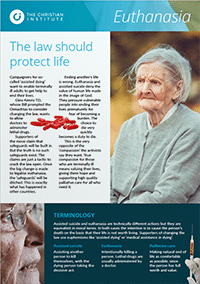A disturbing case of a 29-year-old woman being euthanised in the Netherlands has led to politicians speaking out against changing the law in the UK.
Aurelia Brouwers was killed by a lethal injection last month after arguing that she was “entitled to a dignified death” because of her “rotten life”.
Brouwers maintained an online blog about her experiences of suffering from depression and a borderline personality disorder.
‘Horrified’
Lord Carlile of Berriew of campaign group Living and Dying Well said he was “horrified” at the death.
“This is a case which illustrates the grave dangers presented by euthanasia and assisted dying.”
Fiona Bruce MP described it as “tragic” and pointed out that one in four Britons “experience mental health problems at some time in their life”.
‘Treatment not termination’
“What is then needed, as it was for this young woman, is treatment not termination.”
She added: “The tragedy of her situation shows why it would be so dangerous for us in this country to heed the voices – few but shrill – of those calling for euthanasia to be legalised here.”
The Netherlands became the first country in the world to legalise euthanasia in 2002.
Dementia patients
But a Dutch euthanasia regulator recently quit her job in protest at the killings of patients with dementia.
Berna van Baarsen said she could not support “a major shift” in the interpretation of the euthanasia law to allow for lethal injections for dementia patients.
Last year, a Dutch doctor escaped punishment after euthanising a dementia sufferer.
The woman had previously expressed a desire for euthanasia, but said she did not want to die several times in the days before she was given a lethal injection. The authorities admitted that the doctor had ‘crossed the line’ by giving her the drug and should not have persisted after she showed resistance, but still cleared the doctor.
UK vote
In the UK, campaigners have warned of the dangerous consequences of legalising assisted suicide.
Under the law in England, Wales and Northern Ireland, a person who intentionally encourages or assists the suicide or attempted suicide of another person, commits an offence which carries a maximum prison sentence of 14 years.
A Bill to legalise assisted suicide was soundly defeated in the House of Commons in 2015 by 330 votes to 118.


